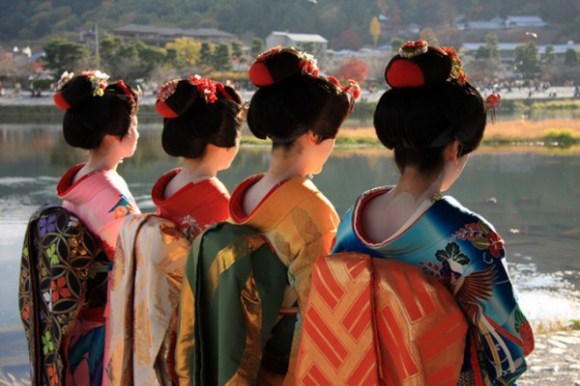
With Japan consistently appearing in the lowest ranks for gender equality in industrialised nations, the adoption of Prime Minister Abe’s recent bill to promote the role of women in the workplace has been a welcome development in what remains a traditionally patriarchal society.
What the headlines fail to mention, however, are the archaic laws entrenched in the country’s Civil Code that continue to hold women back, including same surname requirements upon marriage, and differences in the minimum marriageable age and re-marriage prohibition period for both sexes.
The UN Committee on the Elimination of Discrimination Against Women has again called for a revision of Japan’s current laws, slamming the country for being one of the few industrialised nations where it remains illegal for married couples to have different surnames.
Despite ratifying the Convention on the Elimination of All Forms of Discrimination against Women in 1985, Japan is yet to pass any revisions on glaring inequalities in their Civil Code. While revisions have been presented to the Committee for Discussion of the Legal System for fourteen years now, there has been no progress in respect to the following three points of contention: Article 731, which sets the marriageable age for men at 18 and women at 16; Article 733, which prohibits only women from remarrying within six months unless a woman is pregnant before the divorce; and Article 750, which states a husband and wife must have the same surname upon marriage.
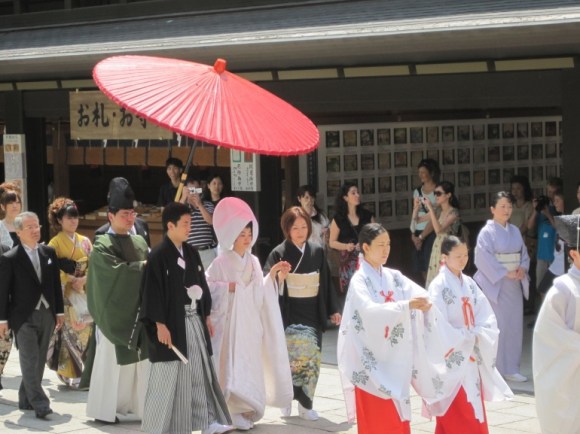
Two landmark cases, contesting the constitutionality of Articles 733 and 750 have been taken to the Supreme Court, with hearings to begin on November 4 this year. A woman in her 20s from Okayama initially filed her case with the District Court in 2013, suing for 1.65 million yen (US$13,734) in damages due to the discriminatory nature of the Civil Code after she had a daughter with her new partner and was unable to remarry nor register her new child’s birth. According to Article 772 of the Civil Code, which is also under review for revision as it pre-dates the advent of DNA testing, a child born within 300 days of divorce is still considered to be the legitimate offspring of the former husband.
Image: Wikipedia
The other case, contesting the constitutionality of the same-surname requirement, has been brought to the Supreme Court after the Tokyo District Court ruled against five people seeking a total of 6 million yen ($49,952) in damages. The plaintiffs believe the law denies equality for all and impinges on the dignity of individuals, which is in direct violation of the Constitution.
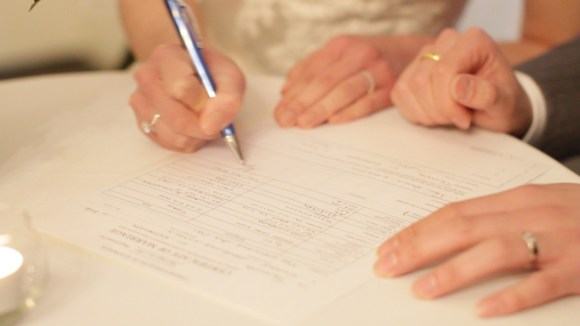
During the Edo Period (1603-1867), commoners were not allowed to have surnames; the legal obligation for married couples to take on the same surname came about during the Meiji Era (1868-1912). In 1996, the Justice Ministry’s Legislative Council recommended introducing a system which would allow women to choose whether they wanted to retain their maiden name or taken on the surname of their husband. Conservative lawmakers continue to oppose any changes, fearing it would be detrimental to family values and society.
Image: Flickr/Nikita
With more women joining the workforce in line with Prime Minister Abe’s push to promote women in the workplace, a recent poll shows 48 percent of people support a change to the surname law. Many women feel that the same-surname requirement violates their privacy, as a name change can reveal sensitive personal events such as a divorce or re-marriage. As a result, there are a large number of women who continue to use their maiden name at work, which causes confusion.
Image: Flickr/Alberto Carrasco-Casado
While there is a loophole for Japanese citizens married to non-Japanese citizens, who don’t necessarily have to have the same surnames due to the difference in foreign legal laws, Japanese couples have no choice but to abide by Japan’s regulations. With the U.N. Committee on the Elimination of Discrimination again calling for Japan to modernise its discriminatory laws, we hope women across the nation will soon be able to enjoy equal rights and the power of choice, bringing the country up to the forefront of the modern world, where it thoroughly deserves to be.
Source: Niconico News
Top Image: Japan Crush

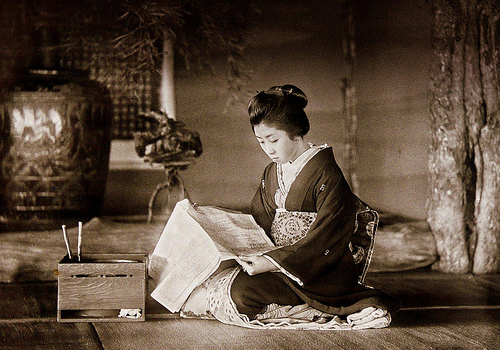
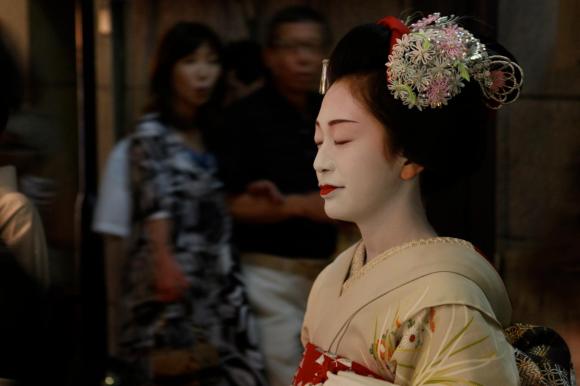
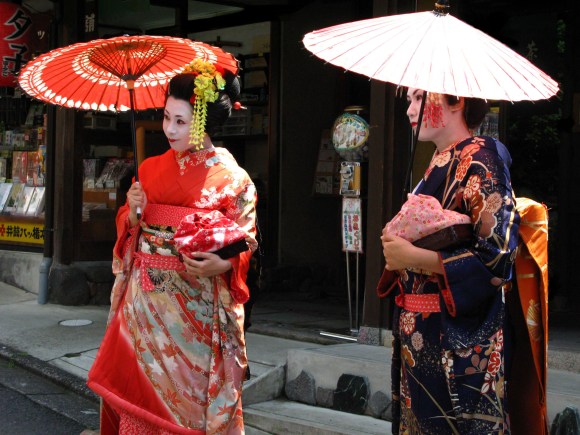
 Japan Supreme Court rules it’s constitutional to require married men and women have same surname
Japan Supreme Court rules it’s constitutional to require married men and women have same surname Married couples in Japan must have the same surname, so does Mr. Sato regret taking his wife’s?
Married couples in Japan must have the same surname, so does Mr. Sato regret taking his wife’s? Japan may finally abolish law that bans women only from remarrying soon after divorce
Japan may finally abolish law that bans women only from remarrying soon after divorce 5 powerful reasons to be a woman in Japan 【Women in Japan Series】
5 powerful reasons to be a woman in Japan 【Women in Japan Series】 Japan Extreme Budget Travel! A trip from Tokyo to Izumo for just 30,000 yen [Part 1]
Japan Extreme Budget Travel! A trip from Tokyo to Izumo for just 30,000 yen [Part 1] Starbucks Japan releases first-ever Hinamatsuri Girls’ Day Frappuccino
Starbucks Japan releases first-ever Hinamatsuri Girls’ Day Frappuccino 7-Eleven Japan’s sakura sweets season is underway right now!
7-Eleven Japan’s sakura sweets season is underway right now! Japanese drugstore sells onigiri at pre-stupid era prices, but how do they compare to 7-Eleven?
Japanese drugstore sells onigiri at pre-stupid era prices, but how do they compare to 7-Eleven? Princesses, fruits, and blacksmiths: Study reveals the 30 most unusual family names in Japan
Princesses, fruits, and blacksmiths: Study reveals the 30 most unusual family names in Japan Transparent coffee! We taste-test Asahi’s Clear Latte, marvel at Japanese drinks wizardry
Transparent coffee! We taste-test Asahi’s Clear Latte, marvel at Japanese drinks wizardry As more foreign visitors visit Kyoto’s top sights, Japanese travelers increasingly staying away
As more foreign visitors visit Kyoto’s top sights, Japanese travelers increasingly staying away Site of Japan’s most famous samurai murder is now a Kyoto karaoke joint
Site of Japan’s most famous samurai murder is now a Kyoto karaoke joint Japan government makes cute illustrated version of radioactive isotope it plans to dump into sea
Japan government makes cute illustrated version of radioactive isotope it plans to dump into sea Swapping seats on Japan’s bullet trains is not allowed, Shinkansen operator says
Swapping seats on Japan’s bullet trains is not allowed, Shinkansen operator says The 10 most annoying things foreign tourists do on Japanese trains, according to locals
The 10 most annoying things foreign tourists do on Japanese trains, according to locals Highest Starbucks in Japan set to open this spring in the Tokyo sky
Highest Starbucks in Japan set to open this spring in the Tokyo sky Tokyo Skytree turns pink for the cherry blossom season
Tokyo Skytree turns pink for the cherry blossom season Starbucks Japan releases new sakura goods and drinkware for cherry blossom season 2026
Starbucks Japan releases new sakura goods and drinkware for cherry blossom season 2026 Japan’s new “Cunte” contact lenses aren’t pronounced like you’re probably thinking they are
Japan’s new “Cunte” contact lenses aren’t pronounced like you’re probably thinking they are Shibuya Station’s Hachiko Gate and Yamanote Line stairway locations change next month
Shibuya Station’s Hachiko Gate and Yamanote Line stairway locations change next month Yakuzen ramen restaurant in Tokyo is very different to a yakuza ramen restaurant
Yakuzen ramen restaurant in Tokyo is very different to a yakuza ramen restaurant Starbucks Japan adds new sakura Frappuccino and cherry blossom drinks to the menu
Starbucks Japan adds new sakura Frappuccino and cherry blossom drinks to the menu Japan just had its first same-month foreign tourist decrease in four years
Japan just had its first same-month foreign tourist decrease in four years Burning through cash just to throw things away tops list of headaches when moving house in Japan
Burning through cash just to throw things away tops list of headaches when moving house in Japan Japan’s newest Shinkansen has no seats…or passengers [Video]
Japan’s newest Shinkansen has no seats…or passengers [Video] Foreigners accounting for over 80 percent of off-course skiers needing rescue in Japan’s Hokkaido
Foreigners accounting for over 80 percent of off-course skiers needing rescue in Japan’s Hokkaido Super-salty pizza sends six kids to the hospital in Japan, linguistics blamed
Super-salty pizza sends six kids to the hospital in Japan, linguistics blamed Starbucks Japan unveils new sakura Frappuccino for cherry blossom season 2026
Starbucks Japan unveils new sakura Frappuccino for cherry blossom season 2026 Foreign tourists in Japan will get free Shinkansen tickets to promote regional tourism
Foreign tourists in Japan will get free Shinkansen tickets to promote regional tourism Take a trip to Japan’s Dododo Land, the most irritating place on Earth
Take a trip to Japan’s Dododo Land, the most irritating place on Earth Naruto and Converse team up for new line of shinobi sneakers[Photos]
Naruto and Converse team up for new line of shinobi sneakers[Photos] Is China’s don’t-go-to-Japan warning affecting the lines at a popular Tokyo gyukatsu restaurant?
Is China’s don’t-go-to-Japan warning affecting the lines at a popular Tokyo gyukatsu restaurant? Survey asks foreign tourists what bothered them in Japan, more than half gave same answer
Survey asks foreign tourists what bothered them in Japan, more than half gave same answer Japan’s human washing machines will go on sale to general public, demos to be held in Tokyo
Japan’s human washing machines will go on sale to general public, demos to be held in Tokyo Starbucks Japan releases new drinkware and goods for Valentine’s Day
Starbucks Japan releases new drinkware and goods for Valentine’s Day We deeply regret going into this tunnel on our walk in the mountains of Japan
We deeply regret going into this tunnel on our walk in the mountains of Japan Studio Ghibli releases Kodama forest spirits from Princess Mononoke to light up your home
Studio Ghibli releases Kodama forest spirits from Princess Mononoke to light up your home Major Japanese hotel chain says reservations via overseas booking sites may not be valid
Major Japanese hotel chain says reservations via overseas booking sites may not be valid Put sesame oil in your coffee? Japanese maker says it’s the best way to start your day【Taste test】
Put sesame oil in your coffee? Japanese maker says it’s the best way to start your day【Taste test】 No more using real katana for tourism activities, Japan’s National Police Agency says
No more using real katana for tourism activities, Japan’s National Police Agency says